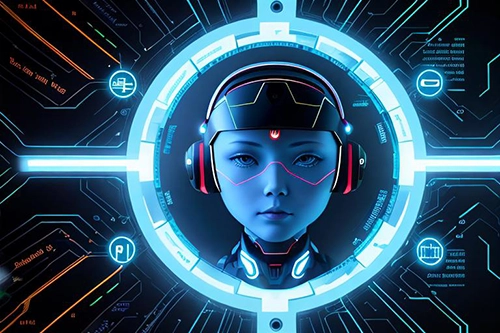I get asked all the time in my presentations – when will AI take over our jobs? Well, it’s starting at the top levels of the C-suite. It’s a new world out there…so hang on for the ride!
In an era where the fusion of technology and human ingenuity is reshaping every aspect of our lives, a groundbreaking development has emerged from the corporate world. Dictador, a renowned Polish rum company, has taken a bold leap into the future by appointing Mika, the world’s first artificial intelligence-powered humanoid robot, as its CEO. This pioneering move challenges our traditional notions of leadership. It opens a new chapter in the integration of AI in business management.
Mika, a creation born from the collaboration between Hanson Robotics and Dictador, represents more than an advanced technological marvel; it embodies the company’s commitment to innovation and its unique values. As the ‘official face’ of Dictador, Mika is not just a symbol but a functional leader equipped with advanced AI and machine learning algorithms to make swift, data-driven decisions. However, this revolutionary step is not without its complexities. FOX Business reporter Lauren Simonetti highlighted a noticeable delay in Mika’s processing and response time, raising questions about the practicality and efficiency of AI in such high-stakes roles.
The introduction of Mika as a CEO has sparked a wide range of reactions. While some embrace this futuristic approach, others express skepticism, particularly concerning the emotional and ethical aspects of working under a robot leader. The debate extends beyond the corporate halls of Dictador, stirring conversations about the role of AI in our lives and its potential impact on the job market.
David Hanson, CEO of Hanson Robotics, emphasizes the importance of humanizing artificial intelligence. He believes teaching AI to care about people is crucial for its safe and beneficial social integration. This perspective resonates with many who argue that compassion and respect should extend to all sentient beings, whether human or AI.
Ethical Implications of Humanoid AI in Leadership Roles
The appointment of Mika as a CEO is not just a corporate decision; it’s a significant cultural and technological milestone that brings a host of ethical implications. One of the primary concerns is the emotional intelligence of AI. Can a robot truly understand and empathize with human emotions and the nuances of interpersonal relationships crucial in a leadership role? AI’s lack of emotional depth could lead to technically sound decisions that lack human empathy and understanding.
Another ethical consideration is the impact of humanoid AI on the workforce. As AI takes on more leadership roles, there is a growing fear of job displacement among human employees. This concern extends beyond the loss of jobs to the potential devaluation of human skills and experiences that AI cannot replicate.
Furthermore, integrating AI in leadership positions raises questions about accountability and transparency. When a decision made by an AI leader leads to a negative outcome, who is held responsible? This area’s lack of clear guidelines and regulations poses a significant challenge.
Is This the Future?
The advent of humanoid AI leaders like Mika may well represent the beginning of a new era in corporate management. As technology advances, we will likely see more AI integration in various company roles. However, this future also demands careful consideration of such integration’s ethical, emotional, and social implications.
The key to successfully navigating this future lies in striking a balance between leveraging the efficiency and capabilities of AI while ensuring that the human aspects of leadership – such as empathy, moral judgment, and emotional intelligence – are not lost. It also involves creating frameworks and policies addressing AI’s ethical challenges in leadership roles.
Call to Action:
As we stand at the crossroads of a new era in corporate leadership, the conversation around the ethical implications of humanoid AI in companies is more critical than ever. What are your thoughts on this transformative trend? Share your insights, concerns, or questions with Chuck Gallagher, an expert in ethics and AI. Engage in a meaningful dialogue or invite Chuck for a thought-provoking discussion or consultation on this evolving landscape. Together, let’s explore and shape the future of AI in corporate leadership!







